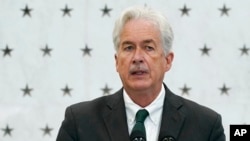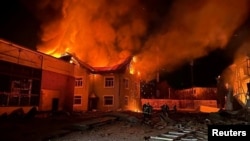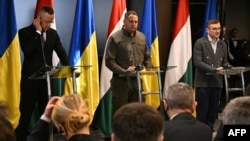With more aid for Ukraine stalled in Congress, U.S. spy chief William Burns says in a new assessment that it would be a self-inflicted mistake of “historic proportions” for the United States to walk away from its support for Kyiv in its nearly two-year war with Russia.
A congressional vote on $60 billion in new aid for Ukraine has been linked with legislation to tighten immigration controls at the U.S. border with Mexico. But details of the new immigration law have yet to be resolved and the overall legislation has been caught up in the politics of the 2024 presidential campaign, leaving more Ukraine aid in doubt.
But Burns, in an essay published Tuesday in Foreign Affairs magazine, said, “Keeping the arms flowing will put Ukraine in a stronger position if an opportunity for serious negotiations emerges" to end the war.
"It offers a chance to ensure a long-term win for Ukraine and a strategic loss for Russia," the Central Intelligence Agency director said.
“At less than 5% of the U.S. defense budget, it is a relatively modest investment with significant geopolitical returns,” he said.
He characterized Russian President Vladimir Putin’s February 2022 invasion of Ukraine as "Putin's folly.”
"At least 315,000 Russian soldiers have been killed or wounded, two-thirds of Russia’s prewar tank inventory has been destroyed, and Putin’s vaunted decades-long military modernization program has been hollowed out,” Burns said.
Yet, Burns said Putin is unlikely to pull back from the attack on neighboring Ukraine.
"It is always a mistake to underestimate his fixation on controlling Ukraine,” Burns said. “Without that control, he believes it is impossible for Russia to be a great power or for him to be a great Russian leader."
Burns said the war "is quietly corroding his power at home,” but said that "he continues to bet that time is on his side, that he can grind down Ukraine and wear down its Western supporters."
He called on Ukraine to strike deeper into Russian-controlled territory.
"Ukraine’s challenge is to puncture Putin’s arrogance and demonstrate the high cost for Russia ... not just by making progress on the front lines but also by launching deeper strikes behind them," Burns said.
Latest Russian attacks
Meanwhile, on the battlefront, Ukraine said Tuesday that Russia’s military attacked overnight with 35 drones and two guided missiles targeting multiple regions of the country.
Ukraine’s air force said air defenses destroyed 15 of the drones, including intercepts over the Mykolaiv, Sumy, Cherkasy, Dnipropetrovsk, Kharkiv, Kherson and Kyiv regions.
The air force said part of Russia’s attack was focused on hitting fuel and energy sector infrastructure.
Russia said Monday its air defenses thwarted attacks by 21 Ukrainian drones.
Russian news agencies reported the military intercepted or destroyed Ukrainian drones over the Russia-annexed Crimean Peninsula, as well as the Russian regions of Belgorod, Bryansk, Kaluga and Tula.
U.S. Secretary of State Antony Blinken warned Monday that Ukraine’s defensive war against Russia was at risk without a new round of aid approved by Congress.
“Without it, simply put, everything that Ukrainians achieved and that we’ve helped them achieve will be in jeopardy,” Blinken said at a joint news conference with NATO Secretary-General Jens Stoltenberg in Washington.
The NATO chief expressed confidence that the U.S. will continue to support Ukraine, saying it is in the interest of the U.S. to ensure that Russia does not win in Ukraine.
Stoltenberg also said that aiding Ukraine is a joint effort with NATO allies and that it is not viewed as charity but as “an investment in our own security.”
Russia-Belarus alliance
Putin met Monday with his Belarusian counterpart, Alexander Lukashenko, to discuss expanding their alliance, which has already seen the deployment of some of Russia's nuclear weapons in neighboring Belarus.
Putin emphasized the two countries’ “strategic partnership” as part of their 25-year union agreement involving political, economic and military ties between the two nations.
“It's important that amid an unprecedented foreign pressure, Russia and Belarus have closely cooperated on the international arena and have offered unfailing support to each other as true allies,” Putin said at the start of the talks in St. Petersburg that involved senior officials from both countries.
Lukashenko has relied on Russian subsidies and political support to rule the one-time Soviet-bloc nation with an iron hand for nearly three decades. Moscow's backing helped Lukashenko survive months of major protests of his reelection in a 2020 vote that the opposition and the West saw as rigged.
Lukashenko allowed Russia to use Belarusian territory to send troops into Ukraine in February 2022.
Hungary-Ukraine talks
Hungary indicated Monday that it is ready for a compromise allowing a proposed European Union aid package of $54 billion for Ukraine to be financed from the bloc's budget ahead of an emergency summit on Thursday.
Prime Minister Viktor Orban has been a vocal critic of the EU's financial and military support for Kyiv and maintained close ties with the Kremlin since the Russia invasion of Ukraine.
If Hungary does not agree on the package, EU leaders have proposed an alternative plan involving a deal between 26 members and Ukraine, which would also deny Budapest access to linked EU funds.
Hungarian Foreign Affairs Minister Peter Szijjarto met with his Ukrainian counterpart, Dmytro Kuleba, in Kyiv to discuss the aid and to address restrictions on the rights of the ethnic Hungarian community in the western Ukrainian region of Zakarpattia to study in their native language.
Hungary has an “expectation that the members of the Hungarian national community will regain their rights that already existed in 2015,” the Hungarian official said, adding, “We still have a long way to go, but we on the Hungarian side are ready to do this work.”
Kuleba said he considered the question of the Hungarian minority “fundamentally resolved,” but that a joint committee will be established to examine how Kyiv can address Budapest's further demands concerning Ukraine's Hungarian community and present those findings to the respective governments in 10 days.
This was Szijjarto’s first visit to Ukraine since Russia’s invasion in February 2022 and the only official bilateral meeting between the two officials in the last two years.
Some material for this report came from The Associated Press, Agence France-Presse and Reuters.





















